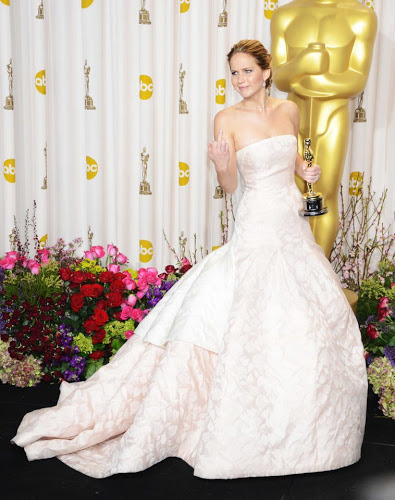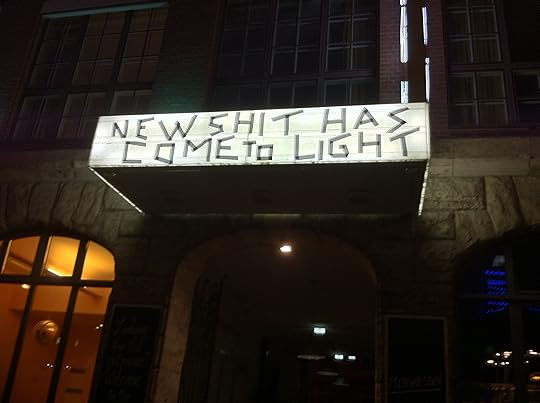Rob Wickings's Blog, page 67
April 10, 2013
Quiet Earth: Rob Saw Oblivion
It's been too long since we've seen a proper, unapologetic future SF movie in the multiplexes. Something with robots and aliens and spaceships.
This is the sort of thing that's been floating my boat since I was a nipper. Big, fat unabashed space opera. And it looks like 2013 is going to be my kind of year. With films like Star Trek: Into Darkness and After Earth hitting screens in the next few months, and big-budget offerings from the likes of Del Toro and Cuarón to come (giant robots! Clooney in space!), it's a bumper year for yer scientifiction buff.
First out of the gates is Joseph Kosinski's Oblivion. A pet project that got the go-ahead after the big business he did on Tron: Legacy, it takes his trademark clean surfaces and arcitectural cool and applies them to a story of an abandoned world, the aftermath of a terrible war–and a dreadful secret.
Earth, after a devastating war against an implacable alien foe. Humanity has won, but victory has cost us the planet. Ma Earth is an irradiated mess, and the remnants of mankind are cutting their losses and moving to a new colony on Titan. All that's left is a caretaker crew, maintaining the drones that will guard the world after its masters have gone. Lucky us, then, that the man in charge is Tom Cruise, whizzing around the globe in a bug-eyed ornithopter, while his girlfriend, played by Andrea Riseborough channeling a young Gillian Anderson, keeps the home fires burning. It's two weeks and counting until they can join the exodus and start a new life.
All is, of course, not what it seems. It seems impossible to greenlight an SF script these days without a head-spinning revelation midway through that turns everything on its head. Oblivion doesn't buck that trend. There's an awful secret to be revealed, and a terrible crime to be avenged. It's a film that's keen to ingratiate itself to the target audience–people like me.
Therein lies the problem. If you're the sort of rabid SF fan that has been waiting for a film like Oblivion, things start looking dreadfully familiar dreadfully quickly. I want to stay relatively spoiler-free (after all, I'm writing this on the afternoon of the film's day of release) but there's a point where the references to classic and modern filmed SF start stacking up more quickly than you can write them. From Moon to 2001, Independence Day to Robocop, Wall-E to The Matrix, it's all in here, whether as a visual reference or a straight plot crib. It starts to feel like an SF mixtape, a supercut of the moments and images you love.
And because I love those references, I can't find it in my heart to hate the film. It's a bit po-faced, and a tad dry in the story-telling. Expect the usual sag at the end of the second act. But Kosinsky has assembled a crack cast (Riseborough in particular is luminous–my earlier Anderson comparison was entirely complimentary) and his reputation as a prime visual stylist is secure. Oblivion has the sharp, clean lines that Syd Mead burned into my cortex when I read Omni in the 80s, and the empty Earth he conjures, landmarks in deserts, the Chrysler Building buried in sand to its spire, is a thing of stark beauty. It's no use pretending that you haven't seen it before, but you've rarely seen it rendered this precisely.
Oblivion is a film that's standing on the shoulders of giants. There's nothing original here. The story is one that could easily have sprung from the pages of Astonishing in the 50s. There are echoes of Theodoe Sturgeon, Larry Niven, even Ray Bradbury. There's even a whiff of Hollywood science in the issues that Tom and Andrea have with orbital line-of-sight comms. So far, so ho hum.
But at the same time, Oblivion does the job asked of it with panache and polish. As a herald to our summer of SF, it's not half bad. Especially if you do a spot-the-references drinking game while you watch. If you're as much of a fanboi as me, you'll be off your face before the credits roll.


April 9, 2013
Rust Never Sleeps
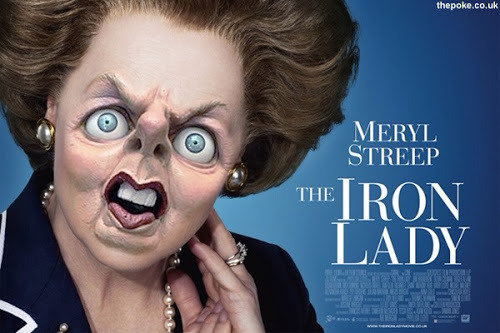
On the day that Margaret Thatcher left office–on the day she was driven from office, bundled into a car and carried away from Downing Street, sobbing–I was living in Bournemouth, working off my student debt. I bumped into a work colleague, who told me the news. We found a pub, and cheerfully toasted the fall of an enemy.
Now, many years later, as I find my newsfeeds swelling with the news that a rogue circuit in her head has finally popped and switched her off for good, I wonder whether celebration is appropriate. She was, after all, a dim shade of the warrior queen that bestrode the affairs of the nation, wild-eyed, her bared teeth set against her many foes. A sick old woman, her past victories no defence against the simple passage of time. For a generation born into Blair's Britain, she means nothing. That's something of a victory in itself.
If only she could be forgotten. The papers and TV have her face on permanent rotation, grinning like a basilisk from every screen and front page. There is a wild scramble to eulogise, to praise her many accomplishments, to gloss over her failings in the misguided notion that it isn't done to speak ill of the dead.
I”m afraid I have no such compuction, and I'm not in the mood to be polite.
When I think of Thatcher, all I can think of are the bad things. The destruction of working communties, the dismantling of our manufacturing base, the sell-off of our rail network, our utilities. Ultimately, the commodification of our very souls. Under Thatcher, we became a meaner, crueller, less unified nation. The collapse of the safeguards which were put in place as we stepped away from the horrors of World War 2 and realised that actually, it's not such a bad idea to look after each other, all of that started on her watch. I'm not alone in thinking that she held on just long enough to see the dismantling of the NHS and the welfare state, just enough to be able to gloat at the culmination of all her dark ambitions in her shadow-barred suite at The Ritz.
There is a school of thought that we should seperate the woman from her deeds, that we should remember her grieving family and show a little respect. Fair enough. Let's show her the same respect she showed to the miners of Wales and the Midlands, to the people she stigmatised under Section 28, to everyone who showed weakness, or dared to ask for a little help. She hated the working class, seeing in them the roots of a past she wanted to erase. She had no time for women, the poor, the dispossessed, the vulnerable. You can't seperate the woman from her actions. Her actions defined her.
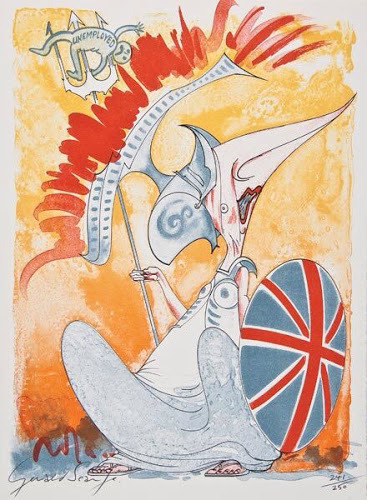
Do I sound angry? Too bloody right. Every time I look at a picture of the woman, I feel a little sick. I couldn't go near the recent revisionist biopic of her life. It was like a horror movie to me. Even the trailer gave me the shudders. I lived with her cruel, divisive policies through my teenage years, and her poisonous legacy lives on today like a toxic fog hanging over us. She spawned Blair and the ConDemNation. Her creatures stain our lives to this day, her economic strategies of benefit only to those she sought to emulate. Her presence has been a chip of cold black glass in my eye for decades, and I mark its removal with a single twinge of regret; that it should ever have been there in the first place.
Do I hate? Yes, I hate. But in the face of evil, hate is often the only appropriate response. Thatcher was a supporter of apartheid, dismissing Mandela as a terrorist. She was a friend to the mass-murdering Chilean dictator Pinochet. She stood against everything that a reasonable society, aware of the responsibility to its population, should embrace. Indeed, her repudiation of the very idea of society, embracing instead a power-crazed free-for-all that tramples our most needy and vulnerable underfoot tells you everything you should know about the woman. She took charge of a sickened country and gave it medicine that was closer to poison than potion. Putting this woman in charge of Britain was like putting your hand in a threshing machine when you needed a manicure.
So, will I celebrate? In my way, yes. There will be no bunting, no popping of corks. But I will tilt a glass, feeling in my heart and guts that little bit lighter, as if a twenty-year-old hangover has lifted. Her children still stalk our land, despoiling as they go. But they mourn tonight, and that brings me strength. These are dark times, but the passing of an enemy can always lift your spirits.
If only they'd play this at St. Paul's when they put her in the ground.


April 2, 2013
Two Books For Your April Pull-list
Some exciting news from Verse Publishing.
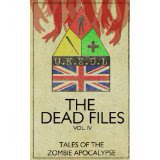
Wisely, they've held off on the announcement until April 2nd, just in case you thought this much good stuff all coming out at once was some kinda joke. But it's real. Verse are putting out two great new collections of fantasy and terror to send chills up your spine and thrills through your bones.
First up, The Dead Files hits Volume 4. After the (comparatively) light and fluffy fun stuff of the Xmas-themed Volume 3, we're serving up a thick slice of the dark stuff. With a roster made up of writers almost entirely new to the franchise, there's some striking and innovative work here exploring the coming Zpocalypse. We'll hear more from a lot of these fresh talents, for sure.
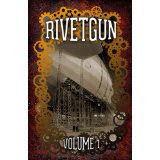
Next, expanding the remit, Verse Publishing is proud to present a steampunk anthology: Rivetgun. With a focus on longer stories, Rivetgun aims to explore the world of cogs, corsets and calamity in bold new ways. I have a tale in here, a dark fabe of colonialism and revolt amongst the stars entitled Zulu Station. Don't be swayed purely by my presence, Readership. There's a ton more steam-driven fun to be had in the pages of Rivetgun. (there's a jingle in there somewhere…)
Both anthologies are available as Kindle downloads right goddam now, with paperback editions coming later this week. Spread the word. Tell your friends. Spend a little money. Call it a springtime treat to yourself, to make the brighter days that little bit darker.
For more, and to check out the full range of books available from Verse Publishing, check out the website.


March 28, 2013
Clive Serves Up A Feast
I hate to bandy the word “triumph” around loosely. But you should always call it as you find it.
There's been a high level of nervous twitch around the latest Feast On Film. For Leading Man Clive, it was an evening that would stand or fall on his choices and his curatory skills. For Doco Dom, it was a chance to prove that his film-making chops were as good as ever in front of an audience of his peers. For me…
Hey, I was calm as all get-out. I didn't have anything to prove.
The Moors Bar film nights are great for two reasons. The atmosphere is always warm, inclusive and solidly supportive. No-one's there to laugh at you for your film-making mistakes. But the shorts that are shown there are always really good. James Rumsey and his guest hosts always manage to find great stuff, and programme thoroughly entertaining nights with enough variety to keep you hooked.
So, to the Leading Man of this particular Feast. Clive was the best-dressed dude in the room, sleek and dapper in a well-cut suit. Somehow, this man is still single. Go figure. Shame on you, ladies.
At a little after 8, after a nervy check that the DVD Dom had brought along played without a problem (the last week had been an education in video file format delivery that led to us bringing three backup discs along–belt, braces and another belt) the lights dimmed, and Clive introduced the first film of the evening.
Time Out, my last Straight 8, and the film I screened, has become more vicious with every view for me. Although it's lightly played, it ends up being a joke with a very nasty punchline. But it still holds up, and the Super 8 4:3 frame is a nice contrast to the rest of the video-based entries. Old school with attitude. I took a few questions (including the dreaded “Where did you get the idea for the film from?”) and I was pleased with the reception. I still get nervous in front of a mike and an audience, though. No way round that apart from experience.
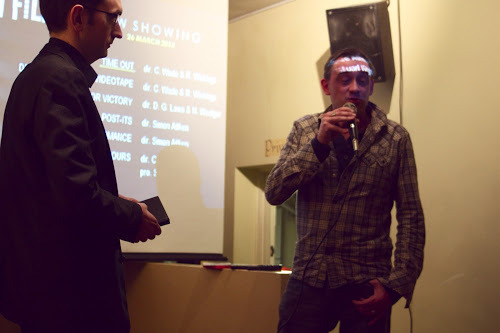
Me, demonstrating glow-in-the-dark on-blogger advertising.
It was my honour to introduce the next film, the longest cut yet of Decks, Dance And Videotape, the documentary about rave culture that Dom and I have been working on since 2004, on and off. It was my big idea to bring this one in. DocoBanksy is coming to an end in production terms, and we need something to occupy our time.
I could fill a book with the high level of twitch and uncertainty that has gone into the making of the half-length cut of DDV. We did everything backwards, and we had no way of knowing if our approach would work until we screened it. It's an uncompromising piece that throws you straight in and expects you to keep up. There's no narration and no friendly captions. We use the participants to tell their stories, and build up a picture of the culture that way. We even hold the titles off until the end.
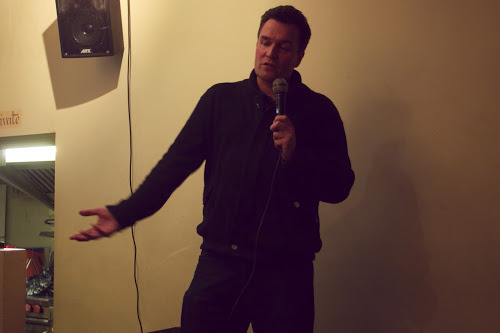
Dom, just before the keychange on his version of Sweet Caroline.
And you know what? It bloody worked. There are great stories, the film motors along and most importantly, we left people wanting more. Dom's Q&A was humble and gently funny, and we walked away with our heads held high–and more importantly with a few new contacts for interviews that would pull the gaps in the narrative together. Big fat win sandwich for the DDV boys.
Darius G Law and Nick Woolger's Digging For Victory closed up the first half. A cut-down version of their feature-length doc on the lives of a bunch of allotment owners in the small town of Capel St. Mary, it's a sweet and cosy film that benefits from the film-makers being on home turf. They reward the trust of their subjects by not trying to invent conflict or drama. You end up caring about the characters all the more, and rooting for them at the final competition. If you'll excuse the pun. Digging For Victory will be getting a DVD release soon, and there's a free packet of seeds with every purchase.
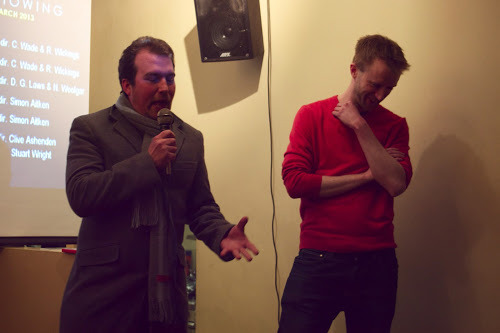
Darius (L) and Nick (R) give us their rousing version of Bohemian Rhapsody
After the break, a double bill from the mighty Simon Aitken. First up, Post-its is an atmospheric tale set in an empty storage facility. A temp arrives, and finds herself directed through her daily tasks by post-it notes that mysteriously appear. Who…or what… is leaving them?
It's a script that Simon agrees was informed by the location, but that's not a problem with a central idea as strong as this. Victoria Johnson shines in a role that puts her at the centre of attention, and the new HD grade of the piece looks lovely.
Simon's latest piece, Digital Romance was up next. It's a dialogue-free rumination on the way modern relationships–and particularly the way that we hook up in the first place–are influenced by technology. It's sharply observed but heart-warming. Shot partially on iPhone, Digital Romance shows how Simon is embracing the advances in digital film-making and rolling them into a lean and adaptable workflow. As a teaser for his upcoming rumination on 21st century relationships, Modern Love, it couldn't be better.
The big finale was, of course, Clive's tense urban thriller, Out Of Hours, which I have written about at length. It was the first time I'd seen it in its final form, and it looks great. Yes, I was the colourist, pardon me if I toot my own horn. It's tight, brutal and unrelenting, with a gritty yet expensive feel. As Clive pointed out in the Q&A afterwards, it was supposed to be a teaser for a bigger feature project. That never happened, but Out Of Hours stands up in its own right. Keep an eye out for it at festivals this year.
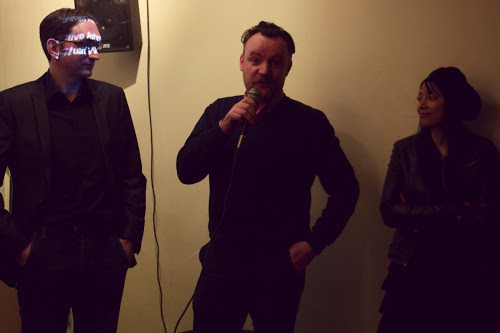
(L-R) Clive, Stu Wright, Maria Thomas. Clive takes self-promotion to a new level.
Clive's Feast On Film pointed out the cross-connections that happen between a community of film-makers, and how working on each others projects can bring out everyone's strengths. Most of the people that worked on Out Of Hours were at the screening, and that sense of support, the sheer willingness to help each other out, could not have been more apparant. The stress and panic of the last couple of weeks simply melted away over the course of an evening, as friends and fellow travellers (including some unexpected visitors–great to see you, Tim and Jaeson!) joined together to share a little magic. Film nights don't get much better than this. Clive, you played a blinder.

The Leading Man. Swoon.
(all pics courtesy of Simon Aitken, who somehow neglected to take a photo of himself. Adds to the mystery, I suppose…)


March 26, 2013
Tonight! Live! In Person!
Readership, here’s your chance to see me in the actual flesh!
I’m appearing tonight as part of Leading Man Clive’s Feast On Film night at Moor’s Bar in Crouch End. I’m showing Time Out, in its first appearance on the big screen in the Director’s Cut. There’s a packed programme of goodies. Apart from me, you can also check out films from the mighty Simon Aitken (including the world premiere of his latest, Digital Romance) Darius Law and Doco Dom Wade, who’s previewing a work in progress cut of Decks, Dance And Videotape, our documentary on rave culture. Can’t wait to see the reaction to that one!
Moor’s Bar is at 57 Park Road, Crouch End, London N7. Doors open at 7:30.
For more details check out the Facebook page.
See you there!
(Image of Hotel Michelburger via travelgenius.net: http://travelgenius.net/berlin-hotel-...)


March 21, 2013
A Review Of Nick Love’s “The Firm”, Focussing Mostly On The Clothes
The first film review from Doco Dom Wade for X&HT looks at Nick Love’ s neglected love story to 80s casual culture, The Firm.
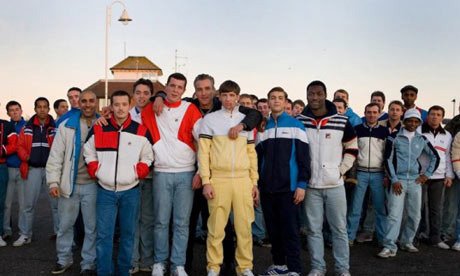
Why was I interested in watching Nick Love’s film The Firm? I enjoyed his gangster flick The Business. Both films are set in the 1980′s, the decade when I came of age. I can relate to the subject matter, to an extent.
I was not a football hooligan. My mum did once say to me she was concerned that I would become a Chelsea fan. What I had done for her to say this, I honestly can not remember. It would be funny if it came after asking her to buy me a Fila tracksuit top. If you are unaware, this type of clothing was part of the uniform for football hooligans in the 80′s.
Something grabbed me about those clothes, I could list various reason for liking them but I don’t think that would explain the attraction fully. It is a tired old statement to say you had to be there, but maybe that is the case with this kind of thing. I was there like many others and we decided together that this was how we wanted to look to the world.
The clothes were out of reach for schoolboys. We did not have the money to buy them. We always want what is just out of reach. Sometimes we get it. Our parents would succumb to our endless requests for those loud brightly coloured clothes, most of which had a logo on them.
Anyway, is this a film review or clothes review? A bit of both, I suppose. Did I enjoy The Firm? I did, but not as much as The Business. Why, you might ask? Does it come down to the fact that gangsters are further away from my life than football hooligans? I guess so. Even in little old Cambridge in the 1980′s there were football hooligans around. It was in the news and I may well have been at school with some real life hooligans. I went to support Cambridge United during this time so I must have been near some of these people. My friends and I just hung around together and I do not think any of my close friends went to join a gang of the hardcore guys who wanted to shout at each other and spill some of each other’s blood for fun.
In the last sentence I have summed up the plot line for The Firm. For me there was not a huge amount going on in the film. No doubt the same can be said about The Business. I know I will be watching The Business again. I am less inclined to watch The Firm again.
At times The Business made me smile. I think the The Firm has a darker overall feel than The Business. So Mister Love must be showing progress with his characters. If you wanted me to pick which set of people I believe really exist, I would say I know that the guys from The Firm are real and the ones in The Business are more fictitious to me.
The music from the 80′s helps you to feel nostagic for the time. The titles have a cool 80′s neon look to them. The fact that I am finding it hard to say much about The Firm maybe shows as I said earlier there is not much going on with the piece overall.
To sum up, if you like the clothes you will enjoy seeing the prime examples of 80s casual wear in The Firm. I noticed the make with the kangaroo for a logo, I cannot remember what they were called. Some more internet research may dig that up.
I think Quadrophenia is going to take some beating in this film making genre. The Firm just sits under it as a nice little document of the times.
(I’m offering an official X&HTrophy to the first person in the comments to tell me which clothing make has a kangaroo as their logo. Terms and conditions apply, once I figure out what they are.)
March 17, 2013
Time Out At Feast On Film
A big night for my film-making network later this month.
The Feast On Film night at Moors Bar in Crouch End has been inviting guest hosts to curate an evening’s entertainment. On March 26th, the takeover will be by none otter than Leading Man Clive Ashenden, who’s putting together a hella good night.
Well, admittedly, I’m a little biased. He’s opening the show with Time Out, which is being shown on the big screen for the first time in its fully finished form. From there, he’s showing a 15 minute cut of Decks, Dance And Videotape (which Dom and I are still working on), followed by a Q&A with the both of us. We may be holding hands for that one.
Another documentary, based on the fast-paced world of allotments from Darius Laws and Nick Woolgar entitled Digging For Victory is followed by a new HD version of Simon Aitken’s intriguing stationary-based thriller Post-Its. I’m looking forward to this one a lot.
The night is finished up with a secret special screening of a film that I couldn’t possibly talk about. All I’ll say is that I was involved in it at both the production and post-production stages. It’s in the blog somewhere if you want a sniff about.
This is a great chance to meet some of the people that I yak about on the blog, and to see some great short films in a warm and friendly atmosphere. I love the Feast On Film nights, and I’m excited to be asked to contribute.
For more details, check out the Facebook page.


March 8, 2013
Fagbreak
Something from the archives.
Actually, this is brand new, in that it's the first time this piece has been published. It was submitted for the sadly-defunct Dirty Bristow magazine. I found it on a trawl through my Dropbox and… well, it's worth sharing, I think.
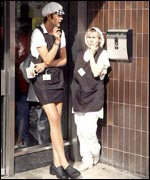
Cigarettes have ruined smoking. Seems like back in the olden days, before your Wiiboxes and talking self-parking cars and magic blue-fluid-guzzling panty liners, smoking was as much an art as a pastime. It was done with a flourish, with a certain chutzpah, and with all kinds of cool gadgets.
Like any addiction, the paraphernalia is as important as the act. Fancy side-opening boxes that look a bit like the magazine for an M-16 and day-glo lighters simply don’t cut it, compared to the smoking fun you could have back when whale hunting and child prostitution were seen as good things.
Pipes. Pipes are cool. Slender, long-stemmed clay jobbies, just the thing for the discerning hobbit that wants to get high. Big fat scrimshawed Meerschaums, monstrous curvaceous chimneys, perfectly accessorised by a walrus mustache and an eyepatch. With one of those things sticking out of your face respect is not just due but offered up as a matter of fact.
Chewin’ tobaccy. Why bother smoking the stuff when you can eat it? Jam a wad of rough shag in-between your molars and you have a delicious taste treat that will make you look like the guy that made Ned Beatty squeal like a pig in Deliverance, and allow you to spit like a camel. Seriously, if you ever felt the urge to gob in someone’s eye, try it with a chewsky backup. That stuff can sting.
From hookahs to snuff, there are so many ways of getting the nicotine tingle into the system that cigarettes seem like a shabby afterthought. I rarely partake myself, although I can be talked into shoving a cigar into my gob when the moon is in the seventh house (i.e. I’m drunk).
I love the way it’ll take all night to work through the dense sausage of leaves, huffing clouds of thick smoke, making me look like a gangster or a slightly less corpulent Winston Churchill. I love the Tom Waits-chewing-gravel tone that my voice takes on the following morning. Cigars also make my breath stink like a cancerous rat that’s been at an ashtray. It’s the glamourous aspect that attracts me, you can tell.
The cigarette, on the other (orange-fingered) hand, debases the whole experience. It’s a quick hit, a scrambled gasp. The sort of thing you can wolf down on the walk from the train station into work. It’s the packet of crisps of the nicotine world. The Happy Meal, compared to the haute cuisine of the hubble-bubble loaded with fine apple tobacco. Not so cheap, and very nasty.
Which brings me onto my central gripe. Finally. The cigarette has taken the whole nicotine experience, stuck it in cheap packaging and turned it into a go-anywhere, have anytime experience (or it did until that there gubmint started a-messin’ with our rights to kill ourselves in the way we feel fit). And because we can, we must. It has become, somehow, a god-given unassailable right to slope out several times a day for a fag break when you’re at work.
The cigarette has taken the mystery and ritual out of tobacco. So the fag break has evolved into a way of re-introducing the theatre into the act. You cannot simply stand up, announce “I shall now partake of a Rothman’s King Size”, and march out to the fire escape. No, you must have a little shadowplay first. You must catch the eye of every other smoker in the room, and do a mime, puffing imaginary smoke rings into the air, furiously waggling your eyebrows. A positive response to this and off you go, hands already delving for the pack of twenty, skipping off with your pals to the wind-scoured corner of the company grounds that have been ring-fenced for the activity. Leaving the rest of us to take up the fucking slack.
The thing that bugs me, the thing that really knots my y-fronts, is the way that Fag-Break Club has it's little secrets. What's said at Fag Break stays in Fag Break. There could be all kinds of juicy gossip, scandal and honest-to-betsy revelations coming out in the corporate smoke shelter, but I won't know anything about them. If I ask what everyone was giggling about when they came back into the building, I get a fob-off and a hand-wave and an airy, “Oh, it was nothing, just a bit of silly, you had to be there really.”
Yeah, right. Tried that. I've crashed that little party once or twice. You and your mates with your coffin nails and me with my froffocaffochino with extra sprinklies. I've tried to be down with the cool kids, huddling up as a cold blast straight from the throat of Siberia tears through the shelter. When I'm around, the conversation dries up, doesn't it? Then it's all grunts and mutters and sighs and looking at watches and “well best get back to it”, isn't it?
Don't think I don't know what's going on, you nicotinious bastards. You're blowing me off in the same way that you puff perfect smoke rings. As soon as I'm not around it's party time again. The future of the company could be decided out by the back loading bay, and I wouldn't know because I choose not to bankrupt and poison myself. Keep Coffee Boy out of the loop. Not one of us. His teeth are entirely the wrong colour.
Well, two can play at that game. Ok, only one at the moment, but it's early days. I've got my club too, my own special secret society, and only cool guys like me that like their coffee hot and milky and overaccessorised can join. We're tucked round the corner from the smokehouse, just within earshot, so I'll know when you start talking about me. It'll be any day now, I'm sure.
Me and my doublechoccolattiato can make up all the gossip we like, and I'll walk back in laughing loudly at the brilliant joke I made up and none of you yellow-tongued cretins would get it even if I told you, which I'm not going to. You'll see. We'll show you. This isn't school any more, and these aren't tears. It's just that the wind has blown your smoke into my eyes.


February 27, 2013
Cloudbusting: Rob Saw Cloud Atlas
Magnificent folly, or Hindenburg-sized crash and burn? Cloud Atlas is so overloaded with ballast and baggage that it would, if we chose, be very easy indeed to scupper.
The film has a lot of strikes against it before we even settle into our seats and the lights dim. Based on a famously unfilmable novel, directed by two maverick film-makers who haven't had a proper hit since the movie that put their names on the map, Cloud Atlas has struggled with financing and distribution from the very beginning. At three hours long, with an interweaving plot based around six different storylines that stretch from the 1840s to the far, uncharted future, it's hardly a popcorn movie.
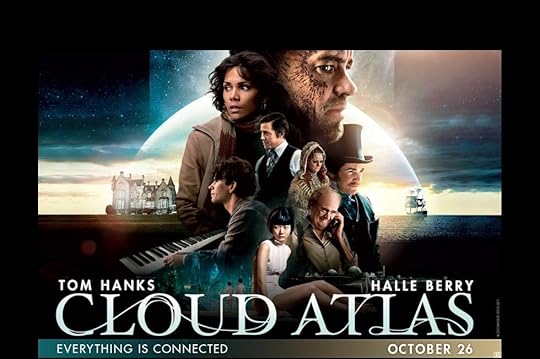
Warner Bros. have handled a movie like this before. Darren Aronofsky's The Fountain ties into many of the same themes and untethered structure of Cloud Atlas. A cosmic, trippy exploration on the nature of eternal love and connection through past and future lives, it very nearly scuppered Aronofsky's career, and is considered by most commentators to be a flop. Warners think they have another Fountain on their hands, and are doing their utmost to control the damage.
So it is that, five months after the US release, my local cinema is showing the film twice daily, in afternoon screenings, in the second-smallest room in the house. It's a perfunctory scheduling at best, and I thought seriously about seeing something else. A three-hour investment of time is not taken lightly when early reviews have swung between tearing the film to shreds and wetting the hem of its robe with convert's tears. It's a love/hate prospect. There are no three-star reviews for Cloud Atlas.
But then, I'm one of the baker's dozen of people that loved The Fountain. I'm drawn to films that dare to ask the big questions, to strive to be more than just a genre exercise or a diversion on a quiet afternoon. I'm attracted to that danger, to the chance to either see something transcendent, or a massive yet gleeful failure.
Cloud Atlas doesn't ease you in. Within the first five minutes, you've skipped across centuries and continents, from a sunlit beach in the Pacific to an interrogation in 23rd century Seoul. It's confident but breakneck film-making, cheeky enough to reassure you that things will slow down a bit, that things will start to mesh, to make sense. For now, as we're introduced to the characters and plots, it's best to settle in and enjoy the ride.

A lot of reviews, taking hints from the Wachowski's SF pedigree, have tagged the film as a futuristic drama. Not true. Only two of the six strands that weave through the film are set in the years ahead. For me, these are the most successful, and in some ways the most closely linked. They tell a story of two worlds, a Mega-City One type urban dystopia, and a far future post-collapse island civilisation. Both are linked by Somni-451, an artificial human slave whose role as a messiah becomes apparant as we drift through the movie. As an SF buff, of course these two stories resonate most strongly for me, and they play to the Wachowski's strengths as masters of visual wizardry. Their Neo-Seoul is a remarkable place, at first glance a dizzying landscape of Speed Racer neon and glistening towers. But we see, as time moves on, that the clean surfaces are only a holographic mask over a city and a society that is rusted and fatally corrupted. We realise that The Fall talked about by the islanders is the collapse of Somni's world. It's mesmerising stuff, and there's nearly a stand-alone film in these two sequences alone.
Elsewhen, we flit between the 19th, 20th and 21st century, following a scientist on his way back to San Francisco after a trip to the Pacific, a composer struggling with the creation of a great new work, a reporter chasing down a tale of corruption in the nuclear industry, and a publisher who finds himself stuck in the loony bin by his scheming brother. Of the four, there's a definite candidate for excision. The modern-day story, starring Jim Broadbent as bumbling fall guy Timothy Cavendish, is broad slapstick comedy that clashes viciously with the slightly dour tone of the rest of the film. If it's meant as light relief, it fails. It's painful stuff, and connecting it to the rest of the stories is something of a push. The one moment that works is a throwaway line–as Tim tries to escape from the clutches of the evil Nurse Noakes, he quotes a line from the chilling SF classic Soylent Green. In Somni's time, we understand where that random phrase came from, and its awful relevance to her future.
The figure of Nurse Noakes brings me to the two big problems I had with Cloud Atlas. The Wachowski's insistence on pushing the theme of interconnectedness led them to cast the same actors in multiple roles. This meant a heavy use of prosthetics, with varying degrees of success. For the most part, it's a jar to see Halle Berry and Doona Bae in whiteface, and Ben Whishaw and Hugo Weaving in drag. OK, you're cutting down on your cast bill, but at the cost of a certain amount of believability.
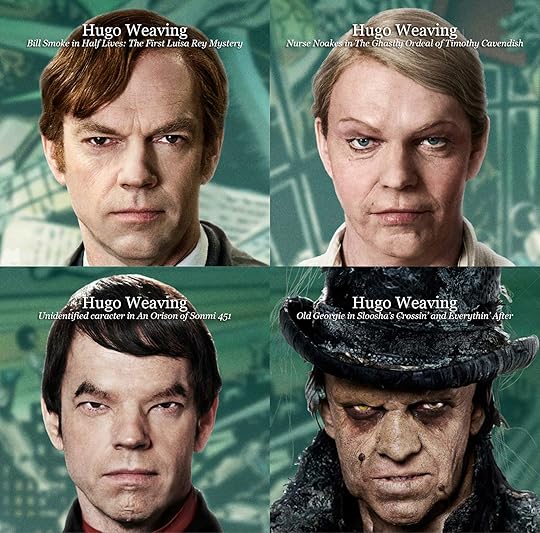
Poor Hugo Weaving gets the heavy end of the make-up brush. As the villain (or at least antagonist) in each piece, he's supposed to be a threatening presence. This works best in the 1970s set thriller, where he plays a convincing hitman. This is, of course, the one time where you can see him as he is. In Somni's world, the makeup gives him the look of a Vulcan with a squint. In the Cavendish story, he looks like a prop-forward in a dress. It's another example of the complete failure of the modern-day sequence, which also features a memoraby awful performance from Tom Hanks as a (I want to say Irish, but I genuinely can't tell with the accent he uses) gangster turned author.
Interconnected as it is, the Cavendish story seems less loosely attached to the rest of the film, which is a relief. It means I don't have to judge the whole on the problems inherent in one weak strand. The thing is, Cloud Atlas is a much cleverer, much more carefully constructed film than you might think. The stories twist and twine against each oter in surprising and unexpected ways, a revelation from one tale echoing into another. “Stories” is an important word here. There are hints that Halle Berry's 70's thriller is just that, a submission for Cavendish's publishing imprint. Ben Whishaw's composer is captivated by the tale of Jim Burgess' poisoned scientist, which he reads in a journal he comes across by accident. Most importantly, Somni's story becomes the framework for the islander's religion–a story that is, in a way sparked by a dodgy film version of Cavendish's biography. Stories have meaning beyond the printed page. Words have the power to change things hundreds of years after they were written.

I found David Mitchell's novel Cloud Atlas to be bloated, annoyingly structured, trite when it tried to be profound, stating the obvious when it tried to be wise. These are accusations that I cannot level at the take that the Wachowskis and Tom Tykwer have put together. By abandoning Mitchell's nested structure they've come up with a film that's never dull, that allows the interwoven nature of the stories and characters they present to chime like a string of bells. Individually, they're pretty. Together, the music is something entirely new. There's much that's clunky, a lot that's a bit preachy. But it's also pacy and, once you settle into the stories, highly accessible. Cloud Atlas is a bold, brave leap into the unknown, an adventurous experiment in technique and non-linear storytelling that deserves a lot more than the lacklustre promotion it's been getting from Warners.
Sadly, it's already been decided that Cloud Atlas is going to be a flop, like John Carter last year. If you want to see it at the cinema (and it is a cinematic experience, even in a basement screen with a faulty projector) you should get a move on. It won't be there for long.
See it, and tell the stories, and let them echo up and down the years.
(amended – earlier versions of this article spelt Tom Tykwer's name wrong. Thanks To Leading Man Clive for spotting the snafu).


February 25, 2013
A Few Quick Thoughts On The Oscars
Everyone else is doing it… so shall I.
1. Much as I hate to agree with Oscar, I thought the choices for Best Film and Best Director were about right. Argo is a great, great film, but it's directed with a very light touch. This isn't a criticism. It's fantastic to see how the man once known as Bennifer has matured as a film-maker. But that understated skilfullness whistled right over Oscar's head. It wasn't directory enough. Not enough fancy bells and whistles. Life Of Pi, on the other hand, is a rotten film with a solid directorial vision stomped all over it. The Oscar judges, as we know from bitter experience, don't do subtle. Argo is by far the more skilfully directed film, but it doesn't have pretty colours or a dancing tiger in it.
2. Clive and I have already posted our disquiet about Quentin Tarantino's script for Django Unchained. (If you've not read our opinion, it's here in all its bloated, overwritten glory) and it seems we're not alone. Jesse Williams, a writer and actor with some serious historical creds has posted an epic takedown of the film here that's essential reading, I think. If you're on Twitter, it's also worth looking at @mypdfscript at the moment, who's enjoying some… shall we say robust discussion with Tarantino fans over his dislike for the movie. I'll just repeat what I said at the time; DU is over-long, bloated and not half as clever or insightful as it thinks it is. A poorly constructed mess that shouldn't have even been in the running.
3. Daniel Day Lewis. Of course he won. He's playing a beloved icon of American history in heavy makeup. Short of having Tom Hanks drag up as Susan B. Anthony, there was no way this was going to anyone else.
4. For the most part, Oscar night was as predictable and pedestrian as always. Adele won for Skyfall – yeah, it's a great song, but there wasn't any meaningful competition. Yay for Christophe Waltz, who proves his chops by making Tarantino's dialogue into something of profound beauty. Haneke was always gonna win for Best Foreign Language film. Sugarman was a lock for best documentary. Paperman had no competition for animated short, although in the long-form category the Pixar skew was a bit unfair this year with strong competition from the stop-motion camp. In general, though, we can sum up with two musical quotes; no alarms and no surprises. Same as it ever was.
5. Everyone loves Jennifer Lawrence now.
